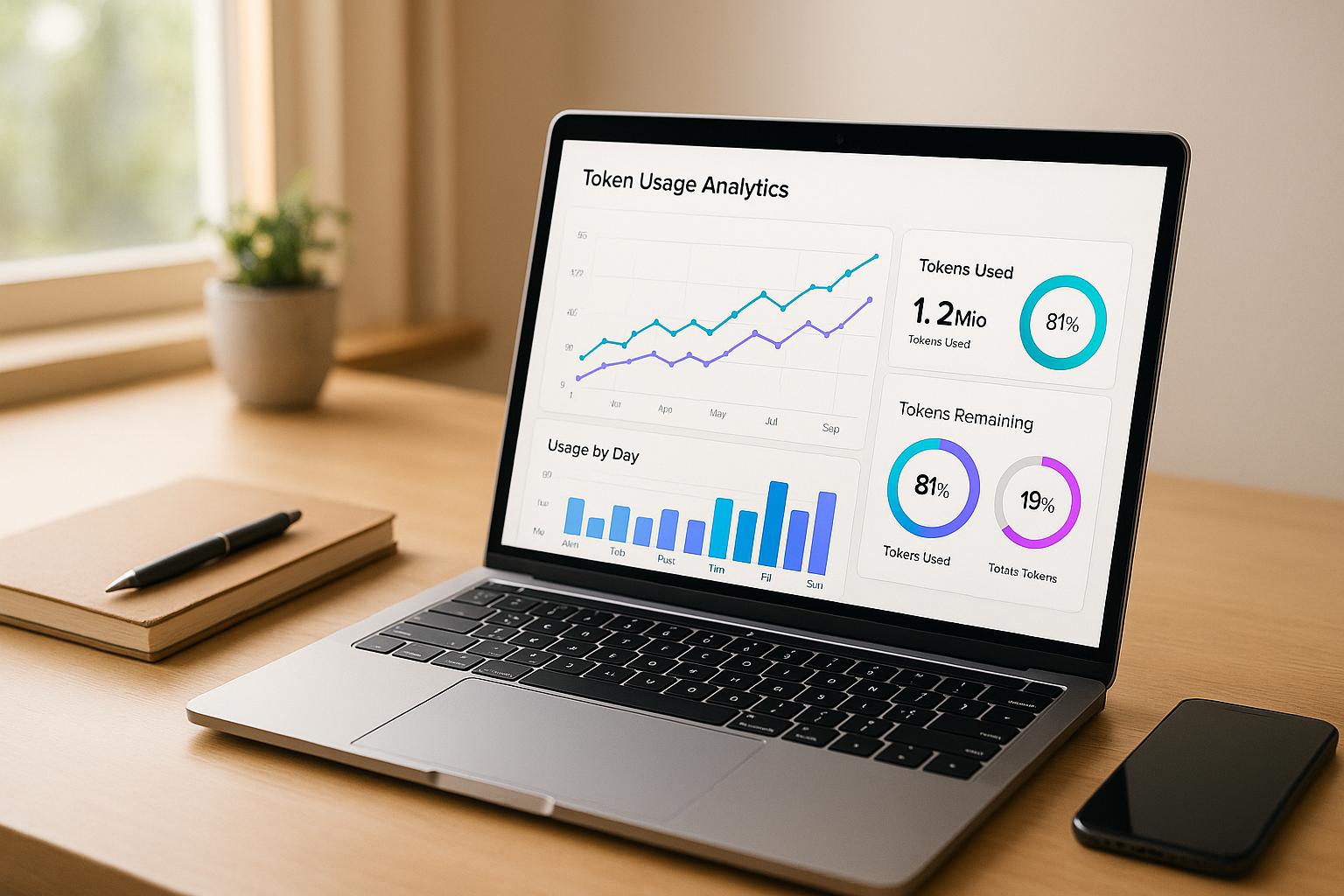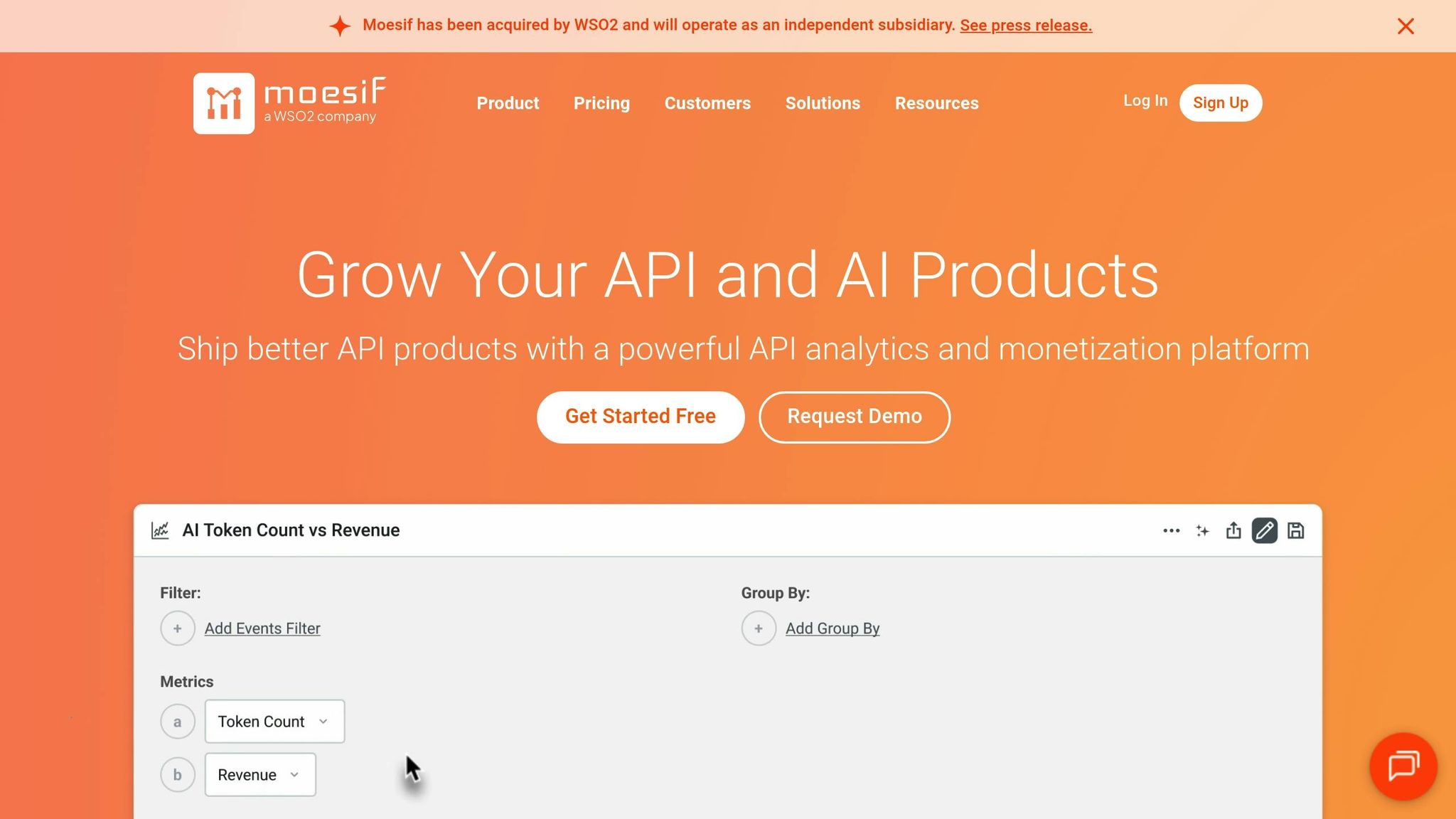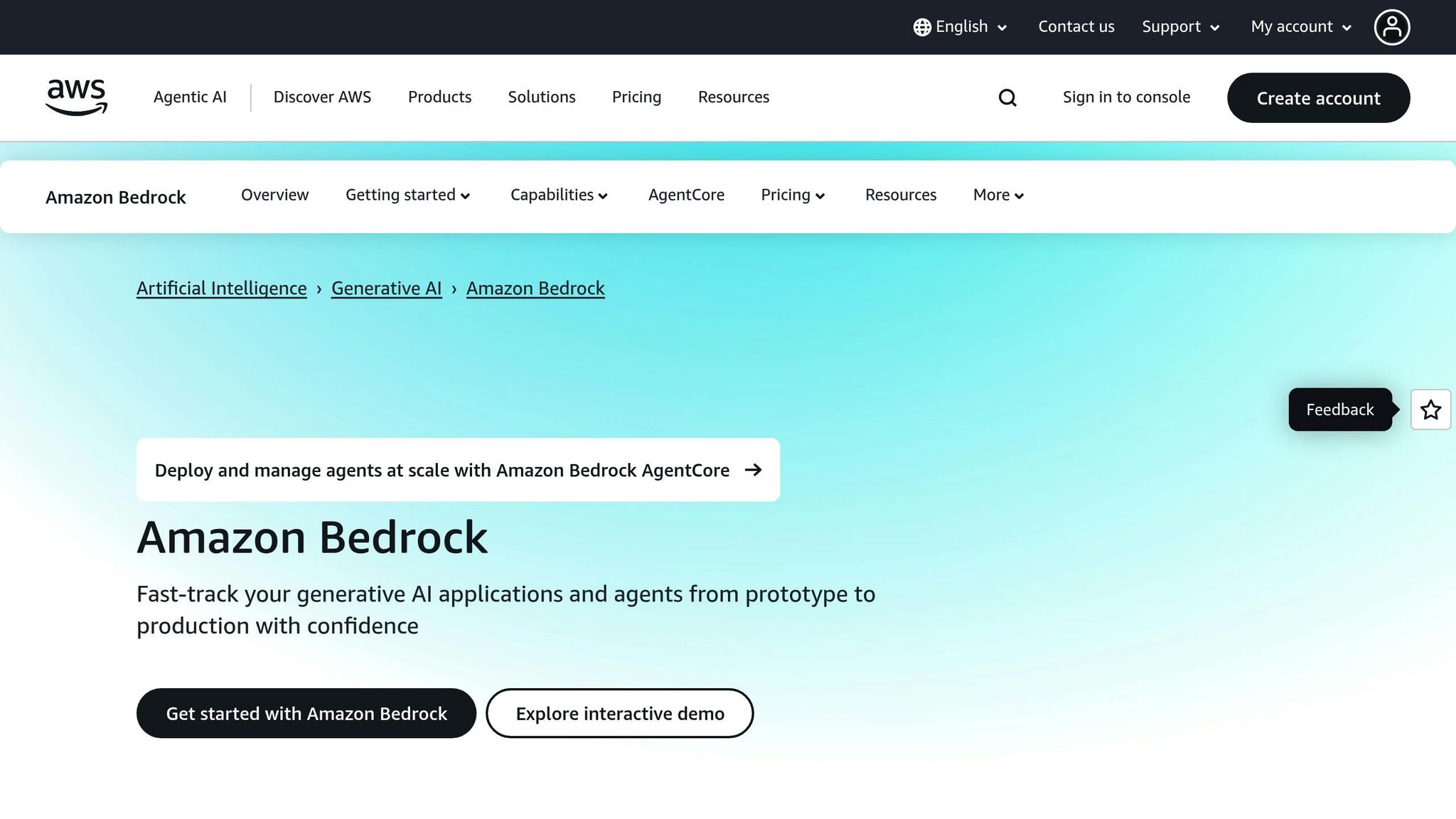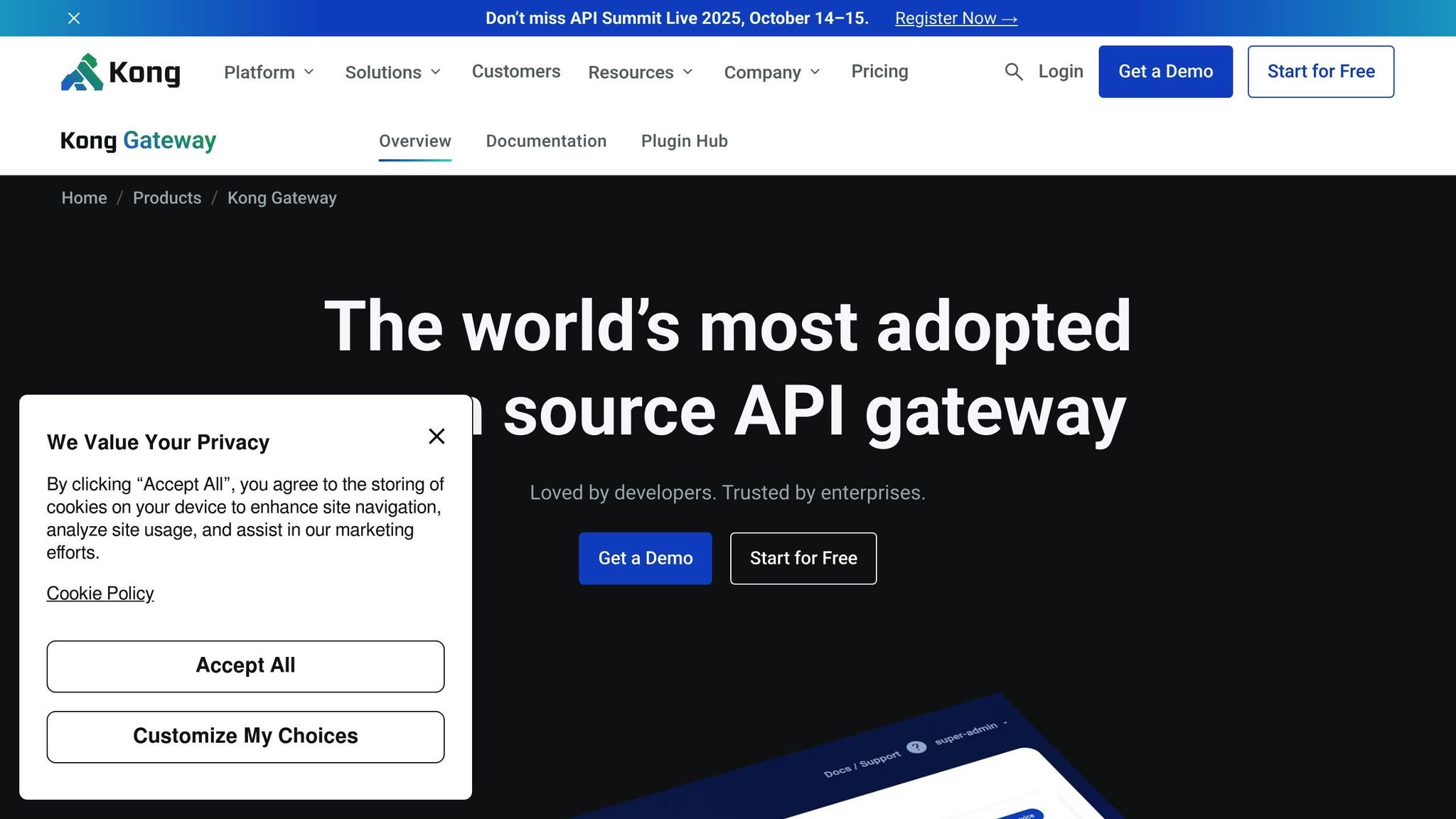
Token tracking is essential for managing AI workflows effectively, ensuring cost control, and optimizing performance. This article reviews four tools designed to monitor token usage across various AI models and APIs. Each tool offers unique features tailored to different organizational needs:
For a quick comparison of their strengths and limitations, see the table below:
| Tool | Key Features | Best For |
|---|---|---|
| Prompts.ai | Centralized tracking, cost insights | Broad AI workflow management |
| Moesif | Detailed API analytics | API-focused teams |
| Amazon Bedrock + CloudWatch | AWS integration, enterprise scalability | AWS users |
| Kong | Real-time rate limiting | High-demand API traffic control |
Choose the tool that aligns with your infrastructure, cost management goals, and AI usage priorities.
Prompts.ai is an AI orchestration platform that integrates token tracking directly into its core design. Unlike other platforms that treat usage monitoring as an afterthought, Prompts.ai incorporates real-time FinOps controls across 35 leading large language models, including GPT-5, Claude, LLaMA, and Gemini. This setup provides clear and actionable insights into AI workflows.
Prompts.ai delivers detailed, real-time tracking of every token used across your AI workflows. You can monitor token consumption by project, department, or specific use case, ensuring a comprehensive view of your AI operations. What makes Prompts.ai stand out is its centralized tracking system. All token usage data is consolidated into a single, easy-to-navigate dashboard, simplifying oversight even when using multiple models.
The platform also enables comparative token analysis. This feature lets users assess token efficiency and output quality across different models for identical tasks, offering insights into both performance and cost-effectiveness.
Prompts.ai seamlessly connects with your existing enterprise systems through an API-first architecture. Development teams can incorporate token tracking into their workflows using REST APIs and webhooks, making it simple to transfer usage data to business intelligence or cost management tools. To ensure security and compliance, the platform integrates with enterprise authentication systems, supporting single sign-on (SSO) and role-based access controls. These integrations provide a solid foundation for effective cost management.
Prompts.ai includes a built-in FinOps layer that turns raw token usage data into actionable cost insights. The platform offers real-time cost tracking along with predictive spending alerts to help you stay on budget. Using its pay-as-you-go TOKN credits system, costs are aligned with actual usage, allowing organizations to allocate expenses to specific projects or departments. This level of transparency in cost management can reduce AI software expenses by up to 98%.
Prompts.ai is built to grow alongside your organization. Whether you're adding new models, users, or entire teams, the platform scales without requiring major architectural changes. Its enterprise-grade infrastructure ensures token tracking remains accurate during high-demand periods, while comprehensive audit trails support compliance needs. This combination of scalability and robust monitoring makes Prompts.ai a versatile solution for organizations of all sizes - from small creative teams to Fortune 500 companies managing complex, multi-model AI workflows.

Moesif serves as a powerful API analytics and monitoring platform, offering detailed tracking of token-level usage for AI applications. With its ability to capture token-level data for large language models like GPT-4 and Gemini, Moesif provides organizations with the granular insights needed to analyze and optimize their AI API consumption effectively.
Moesif excels at tracking input and output tokens for every API call, giving organizations a clear view of how their AI resources are utilized. This level of detail helps teams refine pricing strategies and manage infrastructure costs efficiently.
The platform enables users to configure Time Series charts to monitor prompt, completion, and total token usage by leveraging fields such as response.body.generated_text.usage.prompt_tokens, completion_tokens, and total_tokens. Moesif applies sum aggregation to these fields, offering a comprehensive view of token consumption trends over time.
For APIs that lack a total_tokens field, Moesif allows users to define custom metrics by combining prompt and completion tokens. These features ensure seamless integration with various systems, making token tracking straightforward and effective.
Moesif's token tracking data integrates seamlessly with a wide range of API gateway vendors, including Kong and Amazon API Gateway, as well as server middleware for numerous API frameworks. This compatibility ensures that organizations can implement token tracking regardless of their existing infrastructure.
The platform supports APIs across diverse hosting environments, including on-premises, cloud, and serverless platforms like AWS Lambda, Heroku, and Cloudflare Workers. Its flexibility makes it a strong choice for organizations with varied deployment strategies.
Integration is simplified through easy-to-use SDKs (e.g., Node, Python, Java) and middleware support for environments like AWS Lambda, Heroku, and Cloudflare Workers. For AWS environments, Moesif connects via an AWS Lambda middleware that uses the MOESIF_APPLICATION_ID environment variable to send analytics data directly to the platform.
Additionally, Moesif integrates with KrakenD API Gateway, enabling asynchronous transmission of API activity data. This data can be used to enforce governance and monetization rules in real-time, ensuring that usage policies align with organizational goals.
Moesif’s integrations and analytics capabilities play a key role in cost management by providing clarity on usage patterns. The platform offers a Collector API for high-volume event logging and a Management API for querying usage data. These tools enable teams to embed usage charts into customer-facing applications, supporting transparent billing and usage reporting.
By analyzing token consumption at the API call level, organizations can identify which features, users, or applications are driving costs. This insight allows teams to make informed adjustments to their AI strategies, ensuring resources are allocated effectively.
Built to handle high-volume API traffic, Moesif’s architecture ensures that token tracking doesn’t impact application performance. Its asynchronous data collection minimizes latency, making it well-suited for production environments with demanding performance needs.
With real-time monitoring and historical analytics, Moesif empowers organizations to scale their AI operations while maintaining full visibility into token usage. This scalability supports both technical infrastructure and business growth, catering to teams of all sizes - from small development groups to enterprise-level AI deployments.

Amazon Bedrock, combined with CloudWatch, delivers built-in, detailed token-level monitoring for AI workloads on AWS. This integration tracks usage across foundational models and applications, offering valuable insights for operational and compliance needs.
CloudWatch automatically gathers key metrics like InputTokenCount and OutputTokenCount. When model invocation logging is enabled, it captures additional metadata, such as input.inputTokenCount and output.outputTokenCount, creating a complete audit trail for monitoring and compliance purposes. This detailed logging ensures organizations can keep a close eye on token usage.
With CloudWatch Logs Insights, users can query invocation logs to analyze token usage by identity.arn, allowing them to pinpoint specific users or applications driving token consumption. This level of detail helps organizations identify which parts of their system are contributing the most to token-related costs.
For teams using Retrieval Augmented Generation (RAG) architectures, CloudWatch monitors token usage across both embedding models and the main language models that respond to user queries. These metrics integrate seamlessly with other AWS services, providing a complete view of application performance.
CloudWatch integrates effortlessly across AWS services, offering enhanced monitoring capabilities. For instance, CloudWatch AppSignals automatically tracks generative AI applications built on Bedrock, capturing metrics like prompt_token_count and generation_token_count within correlated traces.
Since each foundation model on Bedrock uses its own tokenization method, the same text can result in different token counts depending on the model. This makes precise tracking essential for optimizing costs when selecting between models.
CloudWatch also provides pre-built dashboards for Amazon Bedrock, giving teams instant access to key metrics like token usage patterns. Additionally, users can create custom dashboards that combine metrics and log data to gain a deeper understanding of their applications.
CloudWatch goes beyond monitoring by offering tools to manage costs effectively. Its pay-as-you-go pricing model is based on the number of input and output tokens processed, making accurate tracking crucial for staying within budget. Teams can set up alerts for InputTokenCount and OutputTokenCount, receiving notifications when usage exceeds predefined limits.
Using CloudWatch Logs Insights, teams can analyze costs through machine learning-backed pattern recognition, which identifies usage trends and groups related logs visually. This feature enables organizations to detect cost drivers and optimize resource allocation.
With CloudWatch AppSignals, teams can compare different foundation models, evaluating their performance, token efficiency, and overall user experience. This helps in selecting the most cost-effective options while maintaining high performance.
CloudWatch is designed to handle the demands of large-scale AI workloads. Built on AWS infrastructure, it supports high-volume token usage without compromising application performance. As token consumption grows, the system scales automatically to meet the increased demand.
To ensure data security at scale, CloudWatch includes Machine Learning Data Protection features that detect and mask sensitive information, such as IP addresses, during token monitoring. This privacy safeguard is particularly valuable for organizations with stringent data governance requirements.
With its ability to process and analyze massive volumes of token data in real time, CloudWatch is well-suited for enterprises managing thousands of AI model invocations daily. It delivers actionable insights to optimize both performance and cost-efficiency, even in large-scale deployments.

Building on earlier token monitoring tools, Kong introduces API rate limiting to directly manage usage. Kong Gateway, an API management platform, offers a versatile plugin system that allows tailored rate limiting for AI-driven workflows.
Kong’s rate limiting capabilities monitor API call counts to provide an accurate picture of token consumption. Its modular framework seamlessly connects with common monitoring tools, enabling alerts when usage exceeds set thresholds. This setup delivers real-time insights, aiding in cost management and supporting proactive measures through integrated alert systems.
Kong is designed to handle high-demand environments, offering scalable solutions that adapt to varying workloads. Its configurable policies empower users to set specific usage limits, ensuring precise control over token consumption within AI workflows while keeping costs in check.
This section provides a closer look at the key benefits and challenges of each tool, helping you align their features with your specific technical and operational requirements.
Prompts.ai offers a streamlined approach to AI orchestration. Its standout feature is a pay-as-you-go TOKN credit system, which ties costs directly to actual usage, eliminating recurring subscription fees. With access to over 35 leading language models, it also boasts impressive cost savings, making it a strong choice for organizations aiming to optimize AI expenses.
Moesif shines in its ability to deliver detailed API analytics, offering granular insights into token consumption and flexible alerting options. However, its primary focus on API monitoring may require additional tools for organizations looking to manage broader AI workflows effectively.
Amazon Bedrock with CloudWatch leverages the strength of AWS’s infrastructure, providing enterprise-grade monitoring and seamless integration for teams already embedded in the AWS ecosystem. This combination supports scalability and compliance needs. However, it comes with challenges, including potential vendor lock-in and the complexity of managing multiple AWS services, which can be daunting for teams without extensive cloud expertise.
Kong's rate limiting specializes in flexible API gateway rate limiting. Its modular plugin system allows for customized token management, making it highly effective in high-demand environments. While it enforces usage limits proactively, the platform often requires additional infrastructure management, and its focus on rate limiting means organizations may need supplementary tools for more comprehensive token analytics.
The table below summarizes the core strengths and limitations of each tool:
| Tool | Key Strengths | Primary Limitations |
|---|---|---|
| Prompts.ai | Access to 35+ models, up to 98% cost savings, pay-as-you-go pricing, real-time FinOps | - |
| Moesif | Granular API analytics, detailed visualization, flexible alerting | Limited to API monitoring; lacks broader workflow tools |
| Amazon Bedrock + CloudWatch | Seamless AWS integration, enterprise scalability, compliance-ready | Vendor lock-in risk; complex multi-service management |
| Kong | Proactive rate limiting, modular customization, handles high-demand environments | Requires additional infrastructure; lacks in-depth analytics |
Selecting the right tool depends on your organization's infrastructure, expertise, and monitoring priorities. If cost efficiency and model flexibility are at the top of your list, Prompts.ai is a strong contender. For those prioritizing detailed API insights, Moesif is a great fit. Teams already entrenched in the AWS ecosystem might find Amazon Bedrock with CloudWatch most convenient, while those needing strict control over API usage will appreciate Kong’s specialized capabilities.
Selecting the right token tracker hinges on your organization's unique requirements, existing systems, and future AI goals. Each tool we've explored brings its own set of strengths tailored to varying operational needs.
Prompts.ai stands out as a unified platform, offering token tracking alongside broader AI orchestration across more than 35 language models. Its pay-as-you-go model ensures costs align directly with actual usage, making it a flexible choice for dynamic needs.
On the other hand, Moesif excels in delivering detailed API analytics, providing clear visibility into token consumption. Its focus on granular insights makes it invaluable for organizations aiming to optimize API usage.
For teams deeply integrated with AWS, Amazon Bedrock offers seamless monitoring through CloudWatch. This enterprise-grade solution is ideal for those already leveraging AWS services and looking for smooth integration into their cloud infrastructure.
Meanwhile, high-traffic environments can benefit from Kong's modular rate-limiting capabilities. Its flexible controls help manage API gateway traffic effectively, ensuring token usage remains under control as demand scales.
Ultimately, the best choice depends on your infrastructure, the level of analytics required, and your orchestration needs. While platforms like Prompts.ai are great for organizations starting their AI journey, more specialized tools may better serve teams with established workflows.
Having scalable and transparent token analytics in place is critical for making informed, cost-conscious decisions as your AI adoption grows.
Prompts.ai introduces a pay-as-you-go credit system that allows businesses to cut AI costs by as much as 98%. This setup ensures you only pay for the resources you actually use, eliminating wasteful spending and providing a cost-efficient solution for managing AI workflows.
The platform also offers real-time insights into token usage and expenses, giving you a clear view of where your budget is going. With precise tracking tools and centralized controls, organizations can keep a tighter grip on their AI-related expenses, allocate resources more effectively, and make informed decisions with confidence.
Moesif delivers in-depth API analytics, focusing on user-centric insights related to API usage, performance, and associated costs. While it excels at tracking detailed API-level data, it may struggle to scale efficiently when managing extensive token monitoring across distributed AI workflows.
Amazon Bedrock, paired with CloudWatch, is designed to integrate seamlessly within the AWS ecosystem. It offers scalable and reliable monitoring tailored for generative AI applications, effortlessly managing high volumes of token-level data. CloudWatch provides real-time metrics, customizable dashboards, and comprehensive insights into system performance, making it a strong choice for large-scale AI operations.
Kong's API rate-limiting proves invaluable in high-demand AI settings where managing token usage is a priority. This capability becomes particularly critical during periods of peak traffic or when handling a large volume of AI-powered requests.
By capping the number of requests or tokens processed within a specific timeframe, these tools help prevent system strain, promote equitable resource distribution among users, and enhance overall resource management. Features such as token-based rate limiting and tiered access models streamline workflow management while ensuring system reliability and stability.


